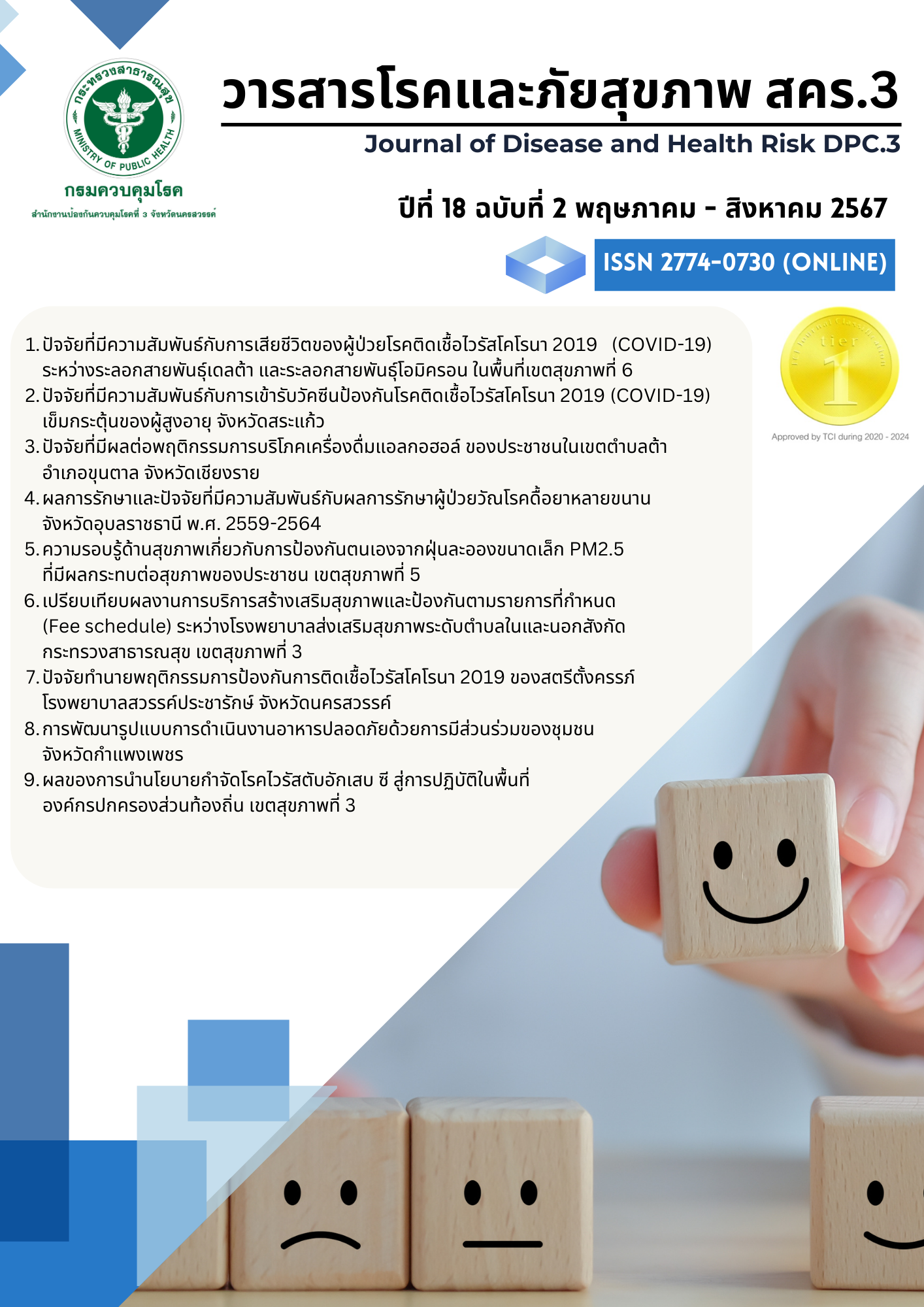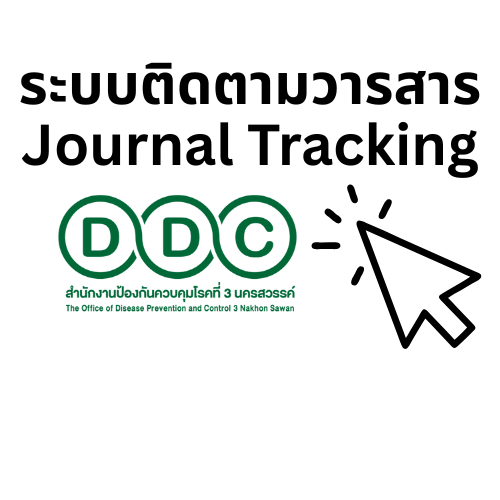Risk Factors for Mortality of Coronavirus Disease 2019 (COVID-19) Patients between Delta Variants and Omicron variants in public health region 6.
Keywords:
Coronavirus Disease 2019 , Delta variants , Omicron variants , MortalityAbstract
This cross-sectional analytical research study aims to present the factors associated with COVID-19 patients’ death during the COVID-19 outbreak in the area of Public Health Region 6. The eligible to recruit death patients from Delta and Omicron variants were 1,428 people and 586 people respectively. Data were analyzed using descriptive statistics and multiple logistic regression for adjusted odd ratio and 95% confidence interval. The results revealed that between deaths of Delta variant outbreak and Omicron variant outbreak. Majority of deaths were found in males, 50.4% and 54.3%. Over 70 years of age, 51.8% and 68.4%. Top 3 most common disease types were: 68.5% and 61.4% had High blood pressure, 45.3% and 36.0% Diabetes, 34.4% and 28.7% Hyperlipidemia. Most had a history of contact with confirmed patients 87.0% and 97.1% and not received the vaccine 78.4% and 58.2%. The main factors that significantly related to Delta outbreaks (P-value < 0.05) were the first time of the COVID-19 vaccination (AOR=111.058), no history of the COVID-19 vaccination (AOR=43.691), Risk from living in risky areas or travel to high-risk areas or coming from a high-risk area (AOR=3.697), class 2 obesity BMI (AOR=2.378), Class 1 obesity BMI (AOR=1.964), High blood pressure (AOR =1.654) had high relationship statistically to the deaths of Delta variant outbreak as compared to the deaths of Omicron variant outbreak. Conversely, Cerebrovascular diseases (AOR=4.367), Bedridden patient (AOR=3.802), Chronic obstructive pulmonary diseases (AOR=2.062), Chronic kidney diseases (AOR =1.634), had high relationship statistically to the deaths of Omicron variant outbreak as compared to the deaths of Delta variant outbreak. Suggestions for patients with underlying diseases of Chronic kidney disease, Cerebrovascular diseases, Chronic obstructive diseases and Bedridden patients during Omicron variant outbreak are proactive managements for surveillance, health services of prompt diagnosis and cares, including a bivalent COVID vaccination to reduce the risk of death from COVID-19 infection.
References
Infectious Diseases Association of Thailand. Knowledge about the coronavirus (Coronaviruses).
[Internet]. [cited 2022 August 11] Available from https://www.pidst.or.th/A215.html
Centre for Health Protection. Coronavirus disease 2019 (COVID-19). [Internet]. 2022 [cited 2022 August 1] Available from: https://www.chp.gov.hk/files/pdf/prevent_pneumonia_thai.pdf
Division of General Communicable Diseases, Department of Disease Control. Guidelines for COVID-19 vaccination in the outbreak situation in 2021 in Thailand, 1st revised edition. [Internet]. 2021 [cited 2022 August 15] Available from: https://tmc.or.th/covid19/download/pdf/covid-19-public-Vaccine-040664.pdf
Department of Disease Control, Ministry of Public Health. Novel coronavirus 2019. [Internet]. 2022 [cited 2022 August 11] Available from: https://ddc.moph.go.th/viralpneumonia/faq_more.php
World Health Organization. WHO Director-General’s opening remarks at the media briefing on COVID-19. [Internet]. 2020 [cited 2022 November 1]. Available from: https://www.who.int/dg/ speeches/detail/who-director-general-s-opening-remarks-at-the-media-briefing-on-covid-19
World Health Organization. Classification of Omicron (B.1.1.529): SARS-CoV-2 variant of concern [Internet]. 2021 [cited 2022 Nov 1]. Available from: https://www.who.int/news/ item/26-11-2021-classification-of-omicron-(b.1.1.529)-sars-cov-2-variant-of-concern
Suchira Banluesin. Report on the impact of the COVID-19 outbreak on non-communicable diseases and related factors in Thailand. [Internet]. 2021 [cited 2022 November 18]. Available from: http://www.thaincd.com/document/file/download/knowledge/ReportImpact64.pdf
Choksuk Kornkittichai. COVID-19 strain “Omicron” (Omicron). [Internet]. 2022 [cited 2022 October 3]. Available from: https://library.parliament.go.th/th/radioscript-rr2565-jan5
Thailand Development Research Institute (TDRI). Three waves of the epidemic, situations, impacts and policy solutions. [Internet]. 2021 [cited 2023 January 30]. Available from: https://tdri.or.th/2021/05/covid-119/
Nithipat Chiarakul. Omicron causes 5 times less pneumonia than Delta, but risk group 608 is still very problematic. Ultimate–Booster. [Internet]. 2022 [cited 2022 December 2]. Available from: https://www.hfocus.org/content/2022/07/25514
Ward IL, Bermingham C, Ayoubkhani D, Gethings OJ, Pouwels KB, Yates T, et al. Risk of covid-19 related deaths for SARS-CoV-2 omicron (B.1.1.529) compared with delta (B.1.617.2):retrospective cohort study. BMJ. 2022 Aug 2;e070695.
Phawasut Boekbaan. Study of the effect of obesity on the development of severe pneumonia in patients with addiction disorders. Coronavirus 2019 treated in field hospitals in Saraburi province. Regional Health Promotion Center 9 Journal. 2022;16(2):550-64. (in Thai)
Bouzid D, Visseaux B, Kassasseya C, Daoud A, Fémy F, Hermand C, et al. Comparison of patients infected with delta versus omicron COVID-19 variants presenting to Paris emergency departments:a retrospective cohort study. Ann Intern Med 2022;175(6):831-837.
Li Q, Liu X, Li L, Hu X, Cui G, Sun R, et al. Comparison of clinical characteristics between SARS- CoV-2 Omicron variant and Delta variant infections in China. Front Med (Lausanne). 2022;9:944909.
Nyberg T, Ferguson NM, Nash SG, Webster HH, Flaxman S, Andrews N, et al. Comparative
Analysis of the risks of hospitalisation and death associated with SARS-CoV-2 omicron (B.1.1.529) and Delta (B.1.617.2) variants in England: a cohort study. Lancet 2022;399(10332):1303–12.
Panthanee Thitichai, Panthila Thaweewiyakarn. Report on the results of reviewing the COVID-19 disease situation and preventive control measures at the global level and in Thailand. [Internet]. 2022 [cited 2023 August 10]. Available from: http://www.thaincd.com/2016/media-detail.php?id=14186&tid=&gid=1-015-005
Thanupong Iamworakitti. Factors predicting the occurrence of severe pneumonia in patients with coronavirus infection 2019. [Internet]. 2023 [cited 2023 August 10]. Available from https://healthregion10.moph.go.th/research_publication/
Downloads
Published
How to Cite
Issue
Section
License
Copyright (c) 2024 Journal of Disease and Health Risk DPC.3

This work is licensed under a Creative Commons Attribution-NonCommercial-NoDerivatives 4.0 International License.
Copyright notice
Article published in the Journal of Disease and Health Risk DPC.3 Nakhon Sawan. It is considered a work of academic research and analysis as well as the personal opinion of the author. It is not the opinion of the Office of Disease Prevention and Control 3, Nakhon Sawan. Or the editorial team in any way Authors are responsible for their articles.
Privacy Policy
Name, address and e-mail address specified in the Journal of Disease and Health Risk DPC.3 Nakhon Sawan. It is used for identification purposes of the journal. And will not be used for any other purpose. Or to another person.









